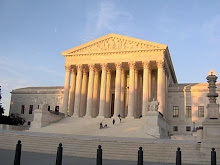The Supreme Court is hearing an interesting case this week regarding students' rights to privacy. As a journalist, I'm of course interested in Constitutional law, but I'm particularly fascinated by how the Court defines students' rights. When I joined the staff of my junior high school newspaper, one of the first assignments was to read about some famous cases regarding student rights and we wrote a term paper on those cases. My interest in Constitutional law and the First Amendment is what made me want to become a journalist. When I first read about this case a year or so ago, I thought of the cases I studied all those years ago.
In Safford School District v. Redding, the issue is whether school officials were right to require a then-13-year-old girl to strip down to her bra and panties while investigating whether she had prescription ibuprofen in her possession. Another student was caught with 400 mg pills — a dose equivalent to two regular Advil. She told school officials she obtained the pills from Savana Redding, now 19.
Redding's backpack was searched and when officials did not find pills, they forced her to strip down and shake out her bra. She did not have the pills. Her parents were not present and they filed suit. The 9th Circuit Court of Appeals ruled the search to be unconstitutional. 
The only ruling that applies to student's Fourth Amendment rights is TLO v. New Jersey. In the 1985 case, a student's purse was searched after she was caught smoking in a bathroom. School officials found marijuana, rolling papers, a large amount of cash, plastic bags and what appeared to be a list of students who owed the girl money. The police were called and the girl later sued, claiming the search was unreasonable. The Court upheld the search, saying school officials have the right to search a student without a warrant if there is reasonable suspicion that something in his or her possession would interfere with the officials' ability to keep the school safe ...
This case seems like a no-brainer, but today's news indicates the justices may be leaning toward an interpretation of the law that could drastically impede students' rights in the future. Justices seem to be leaning toward the idea that the type of drug is irrelevant to whether officials have the right to search a student. This could be an interesting re-interpretation of what constitutes a reasonable search.
In the case currently before the Court, school officials are arguing that the search was reasonable because of the need to keep other students safe.
School officials (and, it seems, some of the Supreme Court justices) defended their actions by claiming they need to protect students from the harmful effects of abusing prescription drugs. While this is of course something schools should do, I see several problems with the argument, not the least of which is that they were basing their search on a single student's story. First of all, if they were so worried that they thought she was hiding pills in her underwear, her parents should have been notified. Second, there was no immediate danger to Redding or other students if they waited for her parents to arrive. Third, there is a world of difference between the types of drugs that are abused and ibuprofen. It is not reasonable to believe that the possession of a non-narcotic pain reliever available over-the-counter poses such a threat to the school that any forced search of a student is Constitutional.
The ruling is expected in June.
Read more On "Students do not shed their Constitutional rights ..."!

